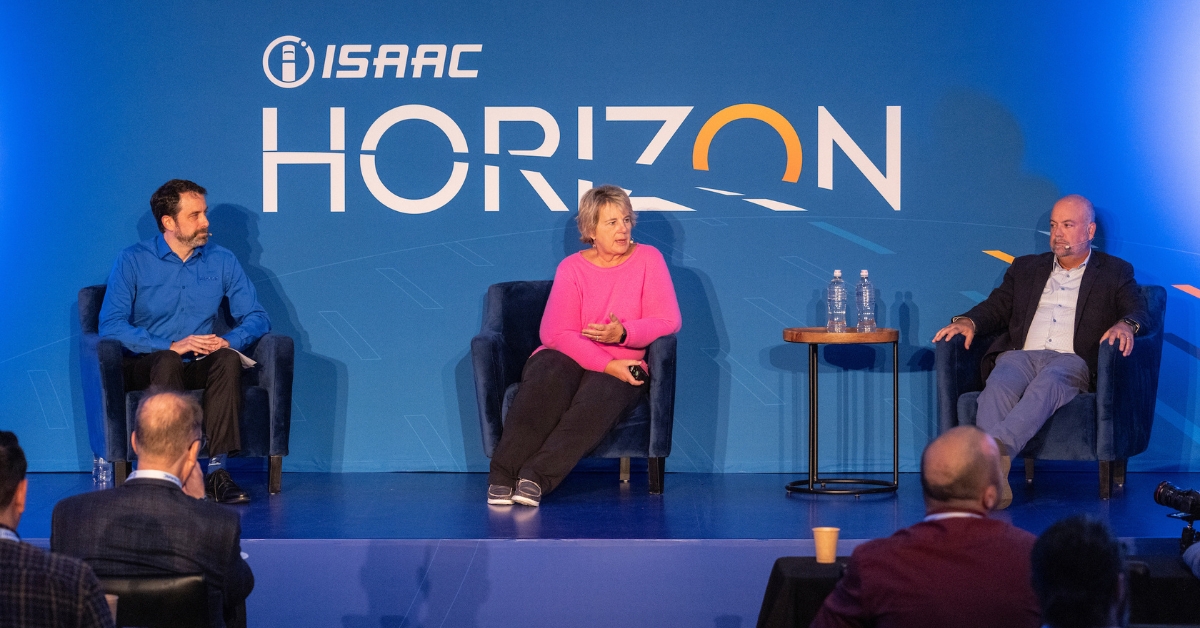The Economy
Among the more than 4,000 respondents across North America, concern over the economy was this year’s most critical trucking industry issue. High diesel prices, inflation, rising interest rates and slumping freight rates have combined to make this “a year of disruptions,” according to ATRI. At the same time, trucking experienced record-high costs in 2022—a 21.3% increase in operational costs over the previous year.
We were fortunate at the user conference to have ATA’s Bob Costello provide his latest economic analysis. He confirmed it’s been a difficult year, especially for those reliant on the spot market. Costello also projected some relief in the spring as excess capacity exits the market.
While so many global economic factors are out of trucking’s control, every feature of the ISAAC solution is designed to maximize revenue and keep costs in check. ISAAC provides a complete solution with exceptional uptime, and manages all rugged hardware, software and network components. It offers operational savings through simpler trip management, which guides drivers with location-based tasks and pre-filled forms, saving time and reducing human error. Likewise, ISAAC’s easy-to-use electronic logging device (ELD) helps ensure drivers and vehicles are always in compliance and avoid unplanned downtime.
Truck Parking
The lack of safe and available truck parking reached No. 2 in 2023, its highest-ever position. Drivers lose an average of $4,600 a year in time spent looking for parking. This is more than an economic issue, as several fatal crashes illustrate the dangerous situation all highway users face when truck drivers are forced to park on the side of the road.
The ISAAC solution can help trucking companies plan and optimize routes in advance, which can factor in the best places for drivers to stop, based on available hours. Dispatch can also help drivers in real time if they are having difficulties locating a safe place to park.
Fuel Prices
Finishing third on the 2023 list was fuel prices, which account for 28% of trucking’s total operating costs, the highest percentage since 2014. High diesel prices are especially challenging for owner-operators, who have ranked fuel prices as their top concern for three consecutive years.
The same week as the user conference, ATRI released new research that showed traffic congestion on U.S. highways added $94.6 billion in costs to the trucking industry in 2021. That equates to more than 460,000 truck drivers sitting idle for one entire work year.
While avoiding traffic jams may be impossible, the ISAAC Coach is a unique, real-time driver coaching system with easy-to-follow visual indicators that helps all drivers boost fuel economy. The ISAAC Coach evaluates driver performance without penalizing drivers for factors outside their control such as load size or wind. A new scientific study from the Traffic Injury Research Foundation (TIRF) has shown the clear link between eco-driving using the ISAAC Coach and improved highway safety.
Driver Shortage / Driver Compensation / Driver Retention
The driver shortage placed No. 4 on the annual survey, just ahead driver compensation (No. 5) and driver retention (No. 7). As the ATRI report points out, these are related workforce issues, though the strategies to address each are distinct.
While some may debate whether or not there is a shortage, we know at ISAAC that fleet clients are always seeking to recruit and retain top-performing drivers, technicians and other back-office positions.
The ISAAC solution is designed to keep drivers happy by delivering them a tablet that is intuitive and simple to use. The predictive workflow provides pre-filled trip information to maximize the productivity of every run.
Fleets can use the ISAAC Coach to implement incentive programs based on a driver’s actual performance. Fleets can see a companywide gain of 5% in fuel economy and create a positive competition among drivers to achieve the highest ISAAC Coach scores.
“A well-executed data-driven driver incentive program can provide considerable return on investment as a result of improved driver safety and reduced accidents, all while enhancing recruitment and retention,” ATRI said.
Partnering with ISAAC elevates the driver experience and boosts retention by setting them up for success. They can rest assured they are compliant with all regulations, on the most efficient route and one click away from being in contact with dispatch to address any problem that arises on the road.
Lawsuit Abuse Reform
Besides fuel costs and the driver shortage, lawsuit abuse reform is the only issue to appear in ATRI’s inaugural survey in 2005 and remain today. It was the sixth biggest concern in 2023, and is closely linked to insurance cost and availability, an issue just outside this year’s Top 10.
ATRI research documented a 40% increase in the liability insurance premium cost per mile over the past decade. An even biggest threat for trucking fleets is the rise of nuclear verdicts. With jury verdicts regularly in the millions of dollars, one accident can jeopardize an entire business.
The ISAAC InView fully integrated video camera system is crucial to defend against the threat of nuclear verdicts. It provides critical footage and undeniable telemetry data that can exonerate drivers and protect your company’s reputation. ISAAC InView dash cams enhance a fleet’s safety and driver training programs, reducing speeding, and other dangerous behaviors. That translates into fewer accidents and a greater chance of keeping insurance premiums in check.
Driver Distraction
Driver distraction, this year’s No. 7 issue, returned to the Top 10 list for the first time since 2018. It was the top concern cited by survey respondents from the law enforcement community and truly is a safety crisis that extends far beyond professional drivers.
Trucking fleets can play a role in reducing distractions on the nation’s highways with their choice of in-cab devices. The ISAAC solution is “built for trucking” because it is rugged and designed specifically for the industry’s harsh conditions. But that also means fleets can customize the apps and integrations that drivers can access on the device, and prevent the use of unauthorized apps when the vehicle is in motion.
By avoiding the use of drivers’ personal devices for work-related tasks, the temptation of distractions is removed.
Detention/Delays at Facilities
Delays at customer facilities placed ninth on the survey, and they continue to create “cascading impacts for drivers as their available hours-of-service are wasted,” according to ATRI.
To better cater to drivers’ needs, ISAAC developed the ISAAC Connect smartphone app. It is a companion application to the ISAAC solution, allowing them to step away from the truck at a rest stop or shipper’s facility and continue on their personal devices conversations started with dispatch on the ISAAC in-cab tablet.
Fleets can also utilize data from ISAAC to pinpoint customers or terminals where delays are creating unfair burdens on drivers.
Zero-Emission Vehicles
This issue made the Top 10 list for the first time in 2023, as government agencies consider aggressive timelines for transitioning vehicle fleets to alternative power. With ISAAC, no matter what is under the hood, the solution can support your fleet’s needs. ISAAC’s experience with electric vehicles dates all the way back in 1996. Known then as ISAAC MotorSports, the company was instrumenting its first fleet of electric trucks that year.
Innovation as Your Ally
As ATRI’s survey shows, there is no shortage of critical issues currently facing this industry. Regardless of what new challenges may emerge next, ISAAC’s continuous innovations in areas including artificial intelligence (AI), business intelligence (BI) and cybersecurity ensure you will always have a reliable telematics partner by your side.
ISAAC is also a member of many trucking associations across the United States and Canada, and our subject matter experts serve on numerous committees. That includes Mike Stapleton, vice president of industry relations, who is a member of ATRI’s Research Advisory Committee. By being active participants, we believe ISAAC can better support trucking’s efforts to reach higher levels of safety, productivity and sustainability.


